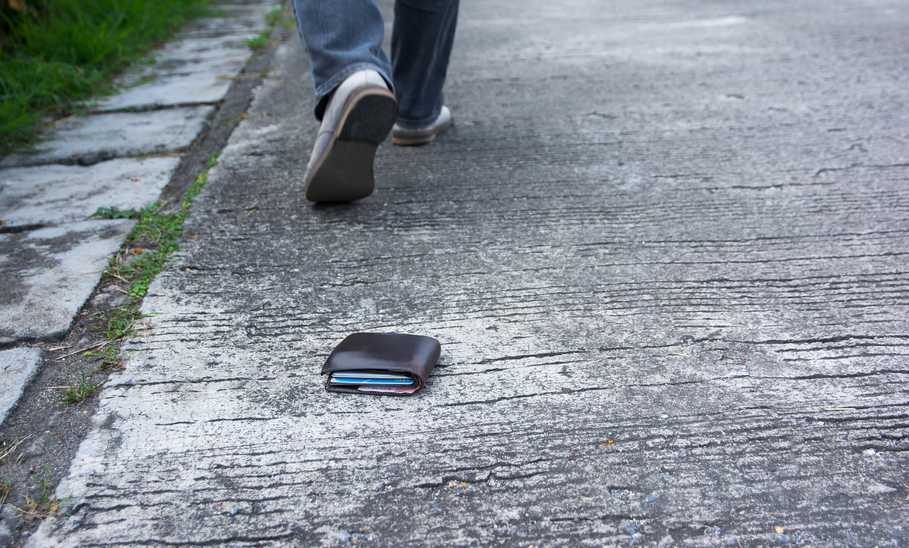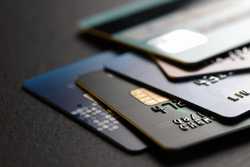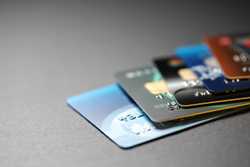What To Do When You Lose Your Credit Card

Our evaluations and opinions are not influenced by our advertising relationships, but we may earn a commission from our partners’ links. This content is created by TIME Stamped, under TIME’s direction and produced in accordance with TIME’s editorial guidelines and overseen by TIME’s editorial staff. Learn more about it.
Everything is going just fine, but suddenly, your palms are sweaty, and your heart starts beating faster. You realize you’ve lost your credit card. It’s not unusual to get nervous when this realization hits, but that doesn’t mean you need to panic.
Instead of getting worried about what might happen, it’s best to spring into action to avoid the worst consequences. Take the right steps and there won’t be any reason to fear what might come next. Here’s what to do when you lose your credit card.
Losing your credit card doesn’t have to be scary. Start by reporting the loss to your credit card company and monitoring your accounts for potential fraud. Then update everything that could make you vulnerable.
If you lose your credit card, the first thing to do is contact the card issuer immediately. Most credit card companies have 24-hour lines for this purpose and reporting it shouldn’t take long. Explain what happened to the representative, and they’ll know what to do.
Many credit card companies also have mobile apps that let you freeze your card. It usually only takes a couple of taps to do this. If you haven’t lost your phone, too, you can do this before calling or while on hold.
Either way, your card will be frozen once you call the issuer and report it stolen. At this point, you won’t be responsible for any fraudulent charges.
Chances are, the card issuer will ask if you want a new card when you call. If you request a new card, your existing credit card number will be deactivated, and you’ll receive a new one with a new card number. The card issuer will send the new card in the mail.
While on the call, ask the card issuer when you can expect the card to be delivered. Typically, you can expect a new card within three to seven business days. If you need the card sooner, ask if expedited delivery is available.
If you are traveling and won’t be able to receive the card at your home address, let the representative know. They can often send a card to you wherever you are, even if you are out of the country. However, you will need to call to request a card if you are away from home. If you request the card online, the issuer will likely send it to the address on file.
Reviewing any recent transactions on your credit card statement is also a good idea. You can find your most recent transactions on the card issuer’s website or mobile app. Report any expenditures you don’t recognize, especially if they occurred after you lost your card.
Remember to check pending transactions when reviewing, as those from the past day or two may not have been posted yet.
Also, the Fair Credit Billing Act limits the amount of fraudulent charges for which you can be held responsible to $50, and many credit card issuers have $0 fraud liability policies. Even if a thief racks up thousands with your stolen card, you can’t legally be held responsible for more than $50.
If you’ve lost your credit card and are still worried about unauthorized transactions, you can set up alerts or notifications. Many banks have services that will send you a text message or email about any transactions with your card. Alternatively, you may be able to up alerts for transactions over a certain amount.
These alerts are to let you know immediately if any transactions are made with your card. If the credit card is lost, any further activity with the card may be fraudulent. You should also report these details to the card issuer.
If you used the lost card as a payment method for any automatic payments, you may need to update those details when you receive the new card. In some cases, automatic payments may switch to the new card without requiring any action from you. However, it’s best to keep tabs on your automatic payments just in case.
To be sure your payments will be processed without issue, make a list of anything you pay automatically. This might include utilities, streaming services, or a gym membership. Then, log into each account and check the payment method. If any of them are linked to your old card, you may need to update it with the new card details once you receive it in the mail.
Placing a fraud alert on your credit report is an extra step you can take to ensure there are no consequences due to losing your card. This can be especially wise if you suspect your personal information may have been compromised.
Identity theft is a serious problem. Placing a fraud alert on your credit report will make it more difficult for identity thieves to open accounts in your name.
If you have reason to believe your online access may have been compromised, it may be a good idea to change your passwords for any online accounts associated with your lost card.
You can also update security settings on your accounts, such as adding two-factor authentication (2FA). Another step would be to update security questions with answers that are not easily guessable.
These steps will make your account more secure, making it more difficult for criminals to gain unauthorized access.
So far, we’ve covered steps to take if you lose your credit card, but what if you find someone else’s card? While being on the other side of the coin is different, the common thread is promptly getting in touch with the card issuer.
While finding someone else’s card is a sensitive issue, taking the appropriate steps can make a positive impact.
It’s possible that you could come across someone who says the found credit card is theirs, especially if you don’t veer too far from where you found it. The person might seem sincere, but don’t hand the card over if this happens. It’s best not to give the card to anyone other than a bank employee or as directed by the card issuer.
The person who approaches you may not be happy when you refuse to give the card to them, especially if the card is, in fact, theirs. However, it’s best not to hand it over in the event that the card isn’t theirs. By calling the issuer, you will ensure the situation is handled properly.
If you find a lost credit card, the issuer might tell you to dispose of the card so that no unsavory characters get hold of it. Here are some general guidelines for correctly disposing of a found credit card:
By taking these steps, you can help ensure that the credit card you find is completely destroyed and cannot be used to make fraudulent purchases. And, of course, you can use the same steps to get rid of a card of yours that’s no longer being used.
Keep your cool and remember you’re protected against credit card fraud. Call your credit card issuer pronto and report your card lost. It will likely send you a new card, and some companies offer expedited delivery. If you find someone else’s card, you should also call the company that issued the card. Don’t give the card to an unknown person unless instructed to do so by the card issuer.
If you lose your credit card, the best thing to do is call your credit card issuer immediately. Since you no longer have the card, look at your bill or google the issuer and get the “report a lost card” number. The company will likely close your existing card and send you a new one. You can often lock or freeze the card using the bank’s mobile app, as well.
If you take the appropriate steps, losing a credit card doesn’t need to be a big deal. You generally can’t be held responsible for more than $50 in unauthorized charges, and many credit card companies have $0 liability policies.
Yes, you should cancel your credit card immediately if you lose it. You can get a replacement card by calling the credit card company. It will usually replace the card free of charge.
They probably won’t go to the International Space Station on the next SpaceX Falcon 9. In some cases, someone who finds a card may try to use it. Or, someone might find it and take no action—or even report it as lost to the card issuer, as we suggest you do if you find a card. Not knowing what will happen, it’s important to call your credit card company as soon as you realize your card is missing.
The information presented here is created by TIME Stamped and overseen by TIME editorial staff. To learn more, see our About Us page.



